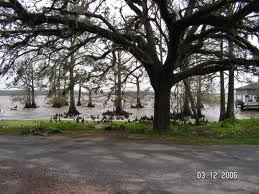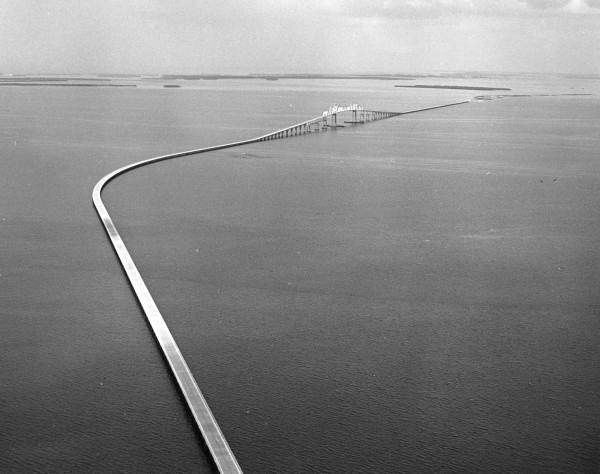The year was 1973. The tale started in New Orleans and ended in Key West. The main players were four college seniors on an adventure.
One of them was a pre-med student. Another was pre-law. One was a history major and the last one wanted to be an artist. They’d convinced their academic advisors that the best use of their January term was to cross the southern part of the United States reading literature of the region as they went.
 Picture them setting off on their journey of discovery at a time when no one rode bicycles. In six weeks, they encountered only one other person on a bike; a teenager in Alabama who pedaled ten miles with them before shouting out that he had to get home for supper and that he wished them well.
Picture them setting off on their journey of discovery at a time when no one rode bicycles. In six weeks, they encountered only one other person on a bike; a teenager in Alabama who pedaled ten miles with them before shouting out that he had to get home for supper and that he wished them well.
Their bikes were packed with tents, sleeping bags and books. For clothes, each carried two pairs of jeans, three changes of underwear, two tie-died t-shirts, one cotton shirt and one jacket. Their whole life for six weeks was compressed into what could fit onto the back of a bike.
Picture them, the college boys from way up north riding with their shoulder-length hair blowing out behind them and their beards growing thicker with each day, passing through the bayous of Louisiana and the small towns of Mississippi and Alabama.
Bennett was one of them. (You met him in Adventures Happen.) He enchanted me on our second date with his tale. The spell cast by the four adventurers led to date three. And four.
I just searched my house for a map or an atlas I could use to trace their trip. I ended up peering at a small globe through a magnifying glass.
They had nothing. No maps, no AAA route, nothing. They just followed the curve of the Gulf of Mexico east and then south. When they lost sight of water they followed their noses.
Or relied on the kindness of strangers (read The Birth of the Vixen Divorcee for more on that topic).
Flumoxed by a Louisiana road that dead ended 20 feet in front of them, the foursome were huddled in conference late one afternoon when an immense RV pulled over and parked on the shoulder. Out popped a white-haired dandy in expensive clothes and a panama hat.
“You boys need a hand?”
“We’ve lost the water,” one of them answered.
“Easy to find again. Back track three miles, take the fork left and you’ll curve right back around to the Gulf. Know that don’t sound like it makes sense, but it’ll get you there. Anything else you need?”
After a full 30 seconds of silence, one of them said, “We’re hungry. We don’t carry much food and we haven’t passed through a town all day.”
“That’s easily fixed,” the stranger said. “I do believe those bikes of yours will just fit into my RV. Load ‘em up and I’ll buy you supper.”
Which is just what he did; stuffed those four boys with fresh gulf fish, mountains of fries and pitchers of beers. They shared stories, including their travel plan and ultimate destination. They gave him a copy of their first book, All The King’s Men, by Robert Penn Warren.
“I promise to read this book,” he said as they unloaded their bikes from his RV. His last words as he climbed up into the driver’s seat was, “Hope to see you again.”
They never planned where they stayed. Never planned anything, really, except the books they read and their ultimate destination. They mostly camped on the edges of trailer parks they came to along their way. They’d build a fire, break out the food they’d bought that day, and then the men would join them.
They learned early on that men were fascinated by them, especially old men. Their wives kept a wary distance. The men took vicarious pleasure in the adventure and freedom represented by the four lean, tanned young men. That very adventure and freedom threatened the domestic security of their wives.
One evening, near the Mississippi/Florida border, only one old codger joined them.
He sat on a log by the edge of their fire for hours, sharing beers and yarns. Finally he stood, stretched and said, “It’s gettin’ chilly and late. Better by gettin’ back to the missus. See you boys in the mornin’,” and disappeared into the dark night.
Fifteen minutes later he re-emerged from the shadows, carrying a blanket, a six-pack of beer and with a friend in tow. The six of them kept on with their talk around that fire until, finally, it was the boys who gave in and headed off for their tents.
Their literary companion for this leg of the journey was Eudora Welty, whose novel, The Optimist’s Daughter, won the Pulitzer Prize for literature the year before.
The worst day, the only day when their hearts sank from the hollow of their chests, through their sturdy legs and landed in the bottoms of their muddy tennis shoes, was Christmas Day. They had biked through ten days of rain; relentless rain. Every item they owned was soaked. Not a dry piece of clothing between them. Not one sleeping bag that wasn’t wet.
Over those ten days, they added a hundred words to describe rain to their vocabularies, none of them good.
Christmas Day, and in their northern homes their families were gathering around crackling fires and brightly lit Christmas trees, opening presents and eating homemade pies, while Bennett and his friends pumped their rock-hard legs across the only piece of terrain that frightened them in six weeks of biking.
The causeway, the long narrow Florida causeway that snaked across the water for miles ahead of them filled them with fear. Fierce winds blew in from the east, sending rain pelting into their faces. Limited visibility, no shoulder on the road to pull onto to dodge traffic, low railings between them and the water, so low each boy pictured himself blowing right off the causeway and into the water.
Then they sensed a vehicle on their tails, not dropping back, not passing, just crawling along behind them at their pace. Fearful of losing their balance in the wind and on the wet pavement, they resisted looking backwards until Bennett, at the back of the pack, couldn’t stand it any longer. He craned his neck to see behind himself, then shouted ahead to his friends, “It’s a cop! He’s got something in his hand.”
He looked back again. “He’s radioing someone. He’s radioing us in.” I can hear the panic in the voice of this upright, law abiding and kind young man as he shouted this last phrase ahead to his buddies, “We’re going to be arrested!”
Sure enough, after ten minutes more of pedaling in this odd procession, they heard a siren behind them, and saw flashing lights atop a black vehicle pass them. They slowed to a stop when a paddy wagon pulled over in front of them.
Picture this; four boys with sopping wet long hair, t-shirts and jeans plastered to their muscular bodies, sandwiched between a paddy wagon and a police car. Two uniformed officers simultaneously got out of their vehicles and rushed at the boys through the rain, both shouting as they ran:
“Are you kids crazy!!”
“You could get killed out here!!”
“This isn’t safe.”
“We’re taking you in.”
Boys and bikes were thrown into the back of the paddy wagon and driven to the far end of the causeway and straight on to a police station.
But not to be arrested. No, instead to be fed, given clean clothes to wear while theirs were dried and allowed to use the telephone to call home. That was the only night, Christmas night, that they slept in beds.
The sun shone on them the last day of their ride. At midday a flashy Cadillac convertible swept past them with two passengers. The elegant woman wore sunglasses and a scarf over her hair, passed across her throat and tied at the back of her neck, just like Audrey Hepburn. The man with thick white hair was expensively dressed. He waved as he passed and shouted, “See you boys at Sloppy Joe’s!”
This was the one improbability event of their journey, because, come nightfall, as they sat at the bar of Sloppy Joe’s, Ernest Hemingway’s favorite Florida hangout and their final destination, in walked their friend from Louisiana, who was also the man who passed them along the road that afternoon. He handed All The King’s Men to Bennett and said, “Thanks for the loan. Fine read. Wanted to make sure I got it back to you. By the way, what you readin’ now?”
They looked at each other for a full 30 seconds in unbelieving silence, wondering if they were under the spell of a shared hallucination, until one of them said, “To Have and To Have Not by Ernest Hemingway.”
http://www.youtube.com/watch?v=cXy3tF5uD6A
I have continued seeing Bennett. You’ll hear more about him.


Georgia,
Allow me to restate my comments on your posting “Adventures Happen”, the story where we first meet Bennett:
“HMM Second date, great taste in cars not to mention women, appreciates, excitement, spontaneous behavior, likes adventure…. If I were a betting man, I would put my money on , “there will be more Bennett stories”. Anyone want to place a bet???”
Et Voila, another story with Bennett. A story, I must say, that makes our protagonist even more interesting than the previous posting. Here we have a young man full of passion, fun, adventure; a spontaneous intelligent individual who will give into the winds of life and go where they lead. What not to love about this man?
Ah but my man-dar is picking up a disruption in the force. We are now onto four dates and I am sensing there exists a “liking” of our hero but it doesn’t feel like there is a romance in the making. Is it that the unexplainable magic ingredient that is so necessary to create a romantic bond between two people has yet to surface? Is it that he is not the one? Or perhaps my man-dar is in serious need of repair and I am way off course. So many questions Georgia and sadly, I know, if asked kindly to continue with the Bennett saga in your next posting, you will say we all must patiently wait for this story to unfold. Wait we shall but patiently…..alas no.
Loved the tale Georgia, let the mystery live on.
BF
Hi Big Fan: You all must wait patiently for this story to unfold.
Hi Georgia
Really liked it, especially the part about old men. That’s who we are. Adventure (as a verb) or die.
Hi Jimmy: Are you off on an adventure?